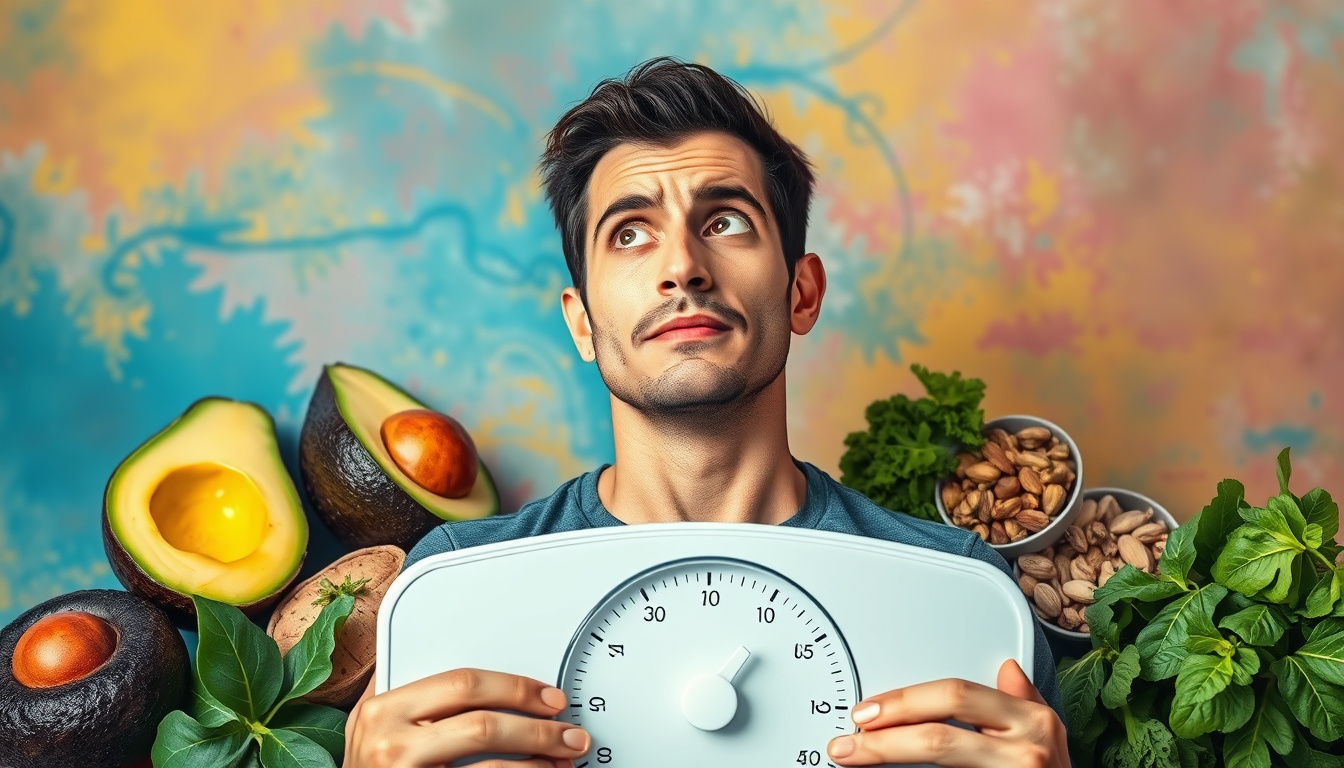
Have you been diligently following the keto diet and not losing weight?
If so, you’re not alone.
Many individuals embark on this low-carbohydrate, high-fat journey hoping to shed extra pounds but encounter unexpected stalls in their progress.
Understanding the intricacies of the keto diet and identifying common pitfalls can be the key to unlocking successful weight loss.
In this article, we will delve into the basics of the keto diet, explore reasons why you may be on the keto diet and not losing weight, and provide practical tips to help you move past those frustrating plateaus.
Download your FREE Macros Tracker Sheet here

TL;DR
- Understanding the fundamentals of the keto diet is crucial for effective weight loss.
- Common pitfalls, such as inadequate calorie tracking and hidden carbs, can hinder progress on keto.
- Balancing macronutrients is essential to maintain ketosis and achieve weight loss goals.
- Hormonal imbalances can significantly affect weight loss outcomes while on the keto diet.
- Implementing strategic changes and being patient can help overcome weight loss plateaus.
Understanding the Basics of the Keto Diet
The keto diet, characterized by its low carbohydrate and high-fat intake, has gained significant popularity for its potential to promote weight loss and improve metabolic health.
However, many individuals find themselves frustrated when they are on keto diet and not losing weight.
This situation can arise due to several factors that might not be immediately apparent.
Firstly, it’s essential to understand that weight loss on the keto diet is not always linear; initial rapid weight loss may plateau as your body adjusts to burning fat for fuel.
Additionally, consuming too many calories from fats, overestimating portion sizes, or inadvertently adding hidden carbs can hinder progress.
Hormonal imbalances, stress, and insufficient hydration also play critical roles in how effectively your body responds to the diet.
Therefore, if you’re finding it challenging to shed pounds while on the keto diet, it’s crucial to evaluate your food choices, portion control, and overall lifestyle factors to ensure you can meet your weight loss goals.
Common Mistakes That Stall Weight Loss
Many people embark on a keto diet with high hopes for rapid weight loss, only to find themselves frustrated by stagnant results.
One of the most common mistakes that stall weight loss on keto diet and not losing weight can often be attributed to misunderstanding the principles of ketosis.
For instance, overconsumption of high-fat foods can lead to a caloric surplus, undermining the very purpose of the diet.
Additionally, neglecting to track carbohydrate intake can easily result in exceeding the daily limit, preventing the body from achieving and maintaining ketosis.
Moreover, some individuals might underestimate the impact of hidden carbs in condiments and processed foods, which can inadvertently sabotage their weight loss efforts.
Lastly, lack of physical activity or excessive stress can hinder weight-loss progress on the keto diet.
It’s crucial to address these common pitfalls to effectively maximize your results and achieve your weight-loss goals.
‘Success is the sum of small efforts, repeated day in and day out.’ – Robert Collier
Download your FREE Macros Tracker Sheet here

The Role of Macronutrients in Ketosis
When embarking on a keto diet, many expect rapid weight loss, yet some individuals find themselves in the frustrating situation of being on keto diet and not losing weight.
Understanding the role of macronutrients—carbohydrates, proteins, and fats—is essential to overcoming this hurdle.
In a state of ketosis, the body shifts its primary energy source from glucose to fats, which means that achieving the correct balance of macronutrients is crucial for effective weight loss.
Typically, a keto diet consists of high fat (about 70-75% of total caloric intake), moderate protein (20-25%), and very low carbohydrates (5-10%).
If you’re on keto diet and not losing weight, it may be due to consuming too much protein, which can inadvertently raise insulin levels, or eating hidden carbs that can stall ketosis.
Additionally, proper hydration and electrolyte management are key factors in maximizing your ketogenic experience.
By carefully monitoring your macronutrient intake and making necessary adjustments, you can unlock the full potential of your keto diet and achieve the weight loss results you desire.
Hormonal Factors Affecting Weight Loss on Keto
When embarking on a ketogenic journey, many people expect rapid weight loss; however, some find themselves on the keto diet and not losing weight, leading to frustration and confusion.
One significant aspect that can affect weight loss on keto is hormonal factors.
Hormones like insulin, leptin, and cortisol play a critical role in regulating body weight, appetite, and metabolism.
On the keto diet, carbohydrate intake is minimized, which can lead to lower insulin levels, potentially promoting fat breakdown.
However, if individuals are still consuming high amounts of protein or are under constant stress, elevated insulin or cortisol levels may hinder weight loss efforts.
Additionally, thyroid hormones, which are crucial for metabolic rate, can also decrease if the body perceives a prolonged caloric deficit.
To effectively navigate this challenge, it’s essential to monitor not just caloric intake, but also how hormonal balance is being affected by lifestyle choices, stress management, and overall nutrition during the keto diet.

Tips for Overcoming Plateaus and Enhancing Results
If you’re on a keto diet and not losing weight, experiencing plateaus is a common challenge that many face during their journey.
To overcome this hurdle, it’s essential to first assess your macronutrient ratios; ensure that your fat intake is sufficient and proteins are not excessively high, which can inadvertently kick you out of ketosis.
Additionally, tracking your food and maintaining a detailed log can help you identify hidden carbs in your diet.
Incorporating intermittent fasting may also boost your body’s fat utilization, promoting further weight loss on a keto diet.
Don’t forget about the importance of hydration; sometimes, water retention can mask your true weight loss.
Lastly, adding variety to your workouts and ensuring adequate rest can enhance your results.
By following these tips, you can reignite your weight loss journey and continue to thrive on your keto diet.
Frequently Asked Questions
What are the main reasons for not losing weight on the keto diet?
Common reasons for not losing weight on the keto diet include consuming too many carbs, not tracking macronutrient intake accurately, inadequate protein consumption, hormonal imbalances, and lifestyle factors such as stress and lack of sleep.
How can I tell if I’m in ketosis?
You can determine if you’re in ketosis by testing ketone levels using urine strips, breath analyzers, or blood tests.
A reduction in hunger, increased energy, and a unique breath odor are also signs of ketosis.
What common mistakes should I avoid on the keto diet?
Avoid mistakes such as eating excessive protein, not consuming enough healthy fats, neglecting to hydrate, and being unaware of hidden carbs in foods.
Additionally, don’t forget to read labels carefully!
How can I overcome weight loss plateaus while on keto?
To overcome plateaus, consider adjusting your macronutrient ratios, incorporating intermittent fasting, increasing physical activity, and ensuring you’re properly hydrated.
Monitoring your food intake more closely can also help.
Are there hormonal factors that can affect weight loss on the keto diet?
Yes, hormonal factors like insulin resistance, cortisol levels, and thyroid hormone imbalances can all impact weight loss on keto.
It’s important to address these issues with a healthcare professional if you suspect they may be affecting your weight.
[color=rgb(10, 10, 10)][highlight=rgb(255, 248, 231)] As an Amazon Affiliate, Savvy Keto makes a commission (at no extra cost to you) on purchases you make thru links on this site.[/highlight][/color]




